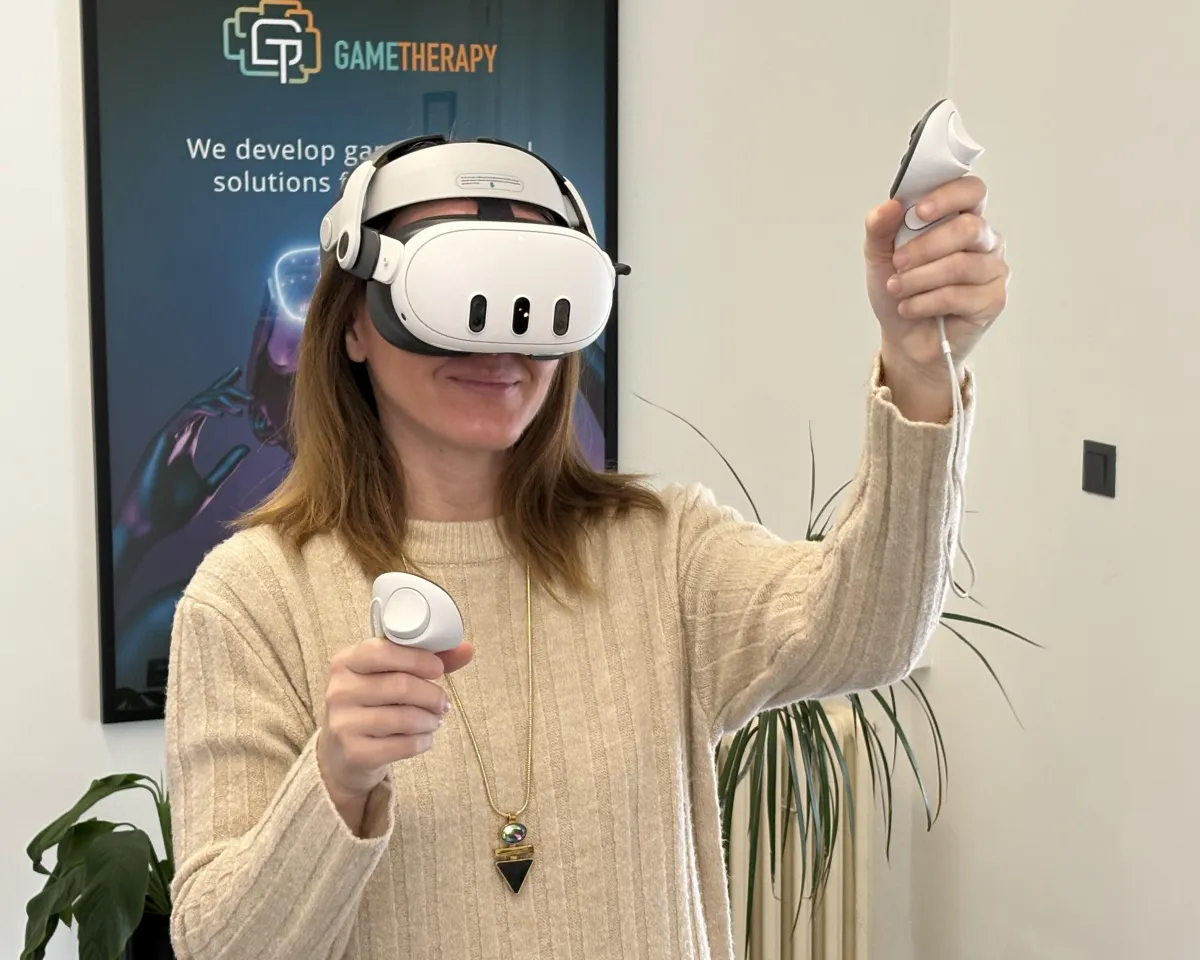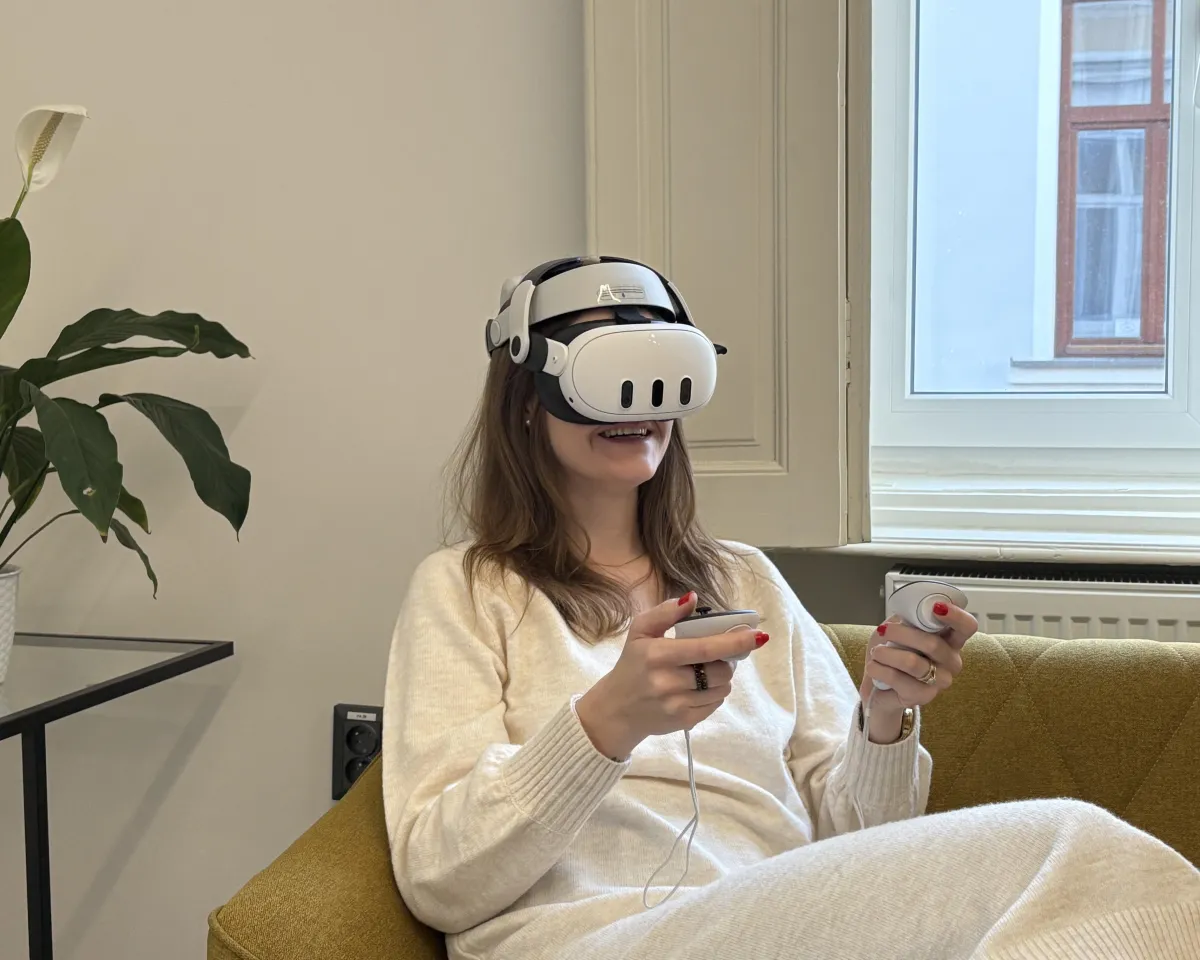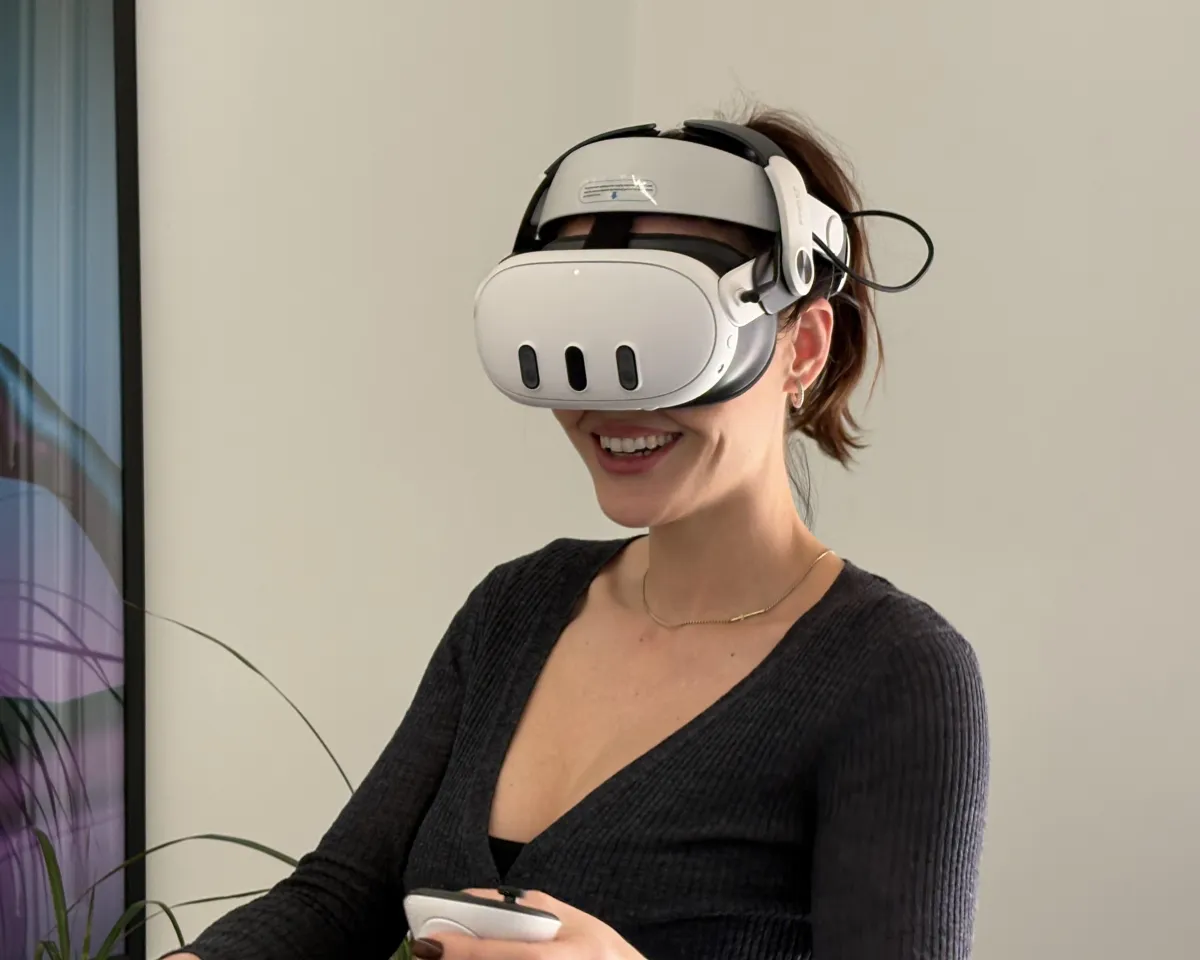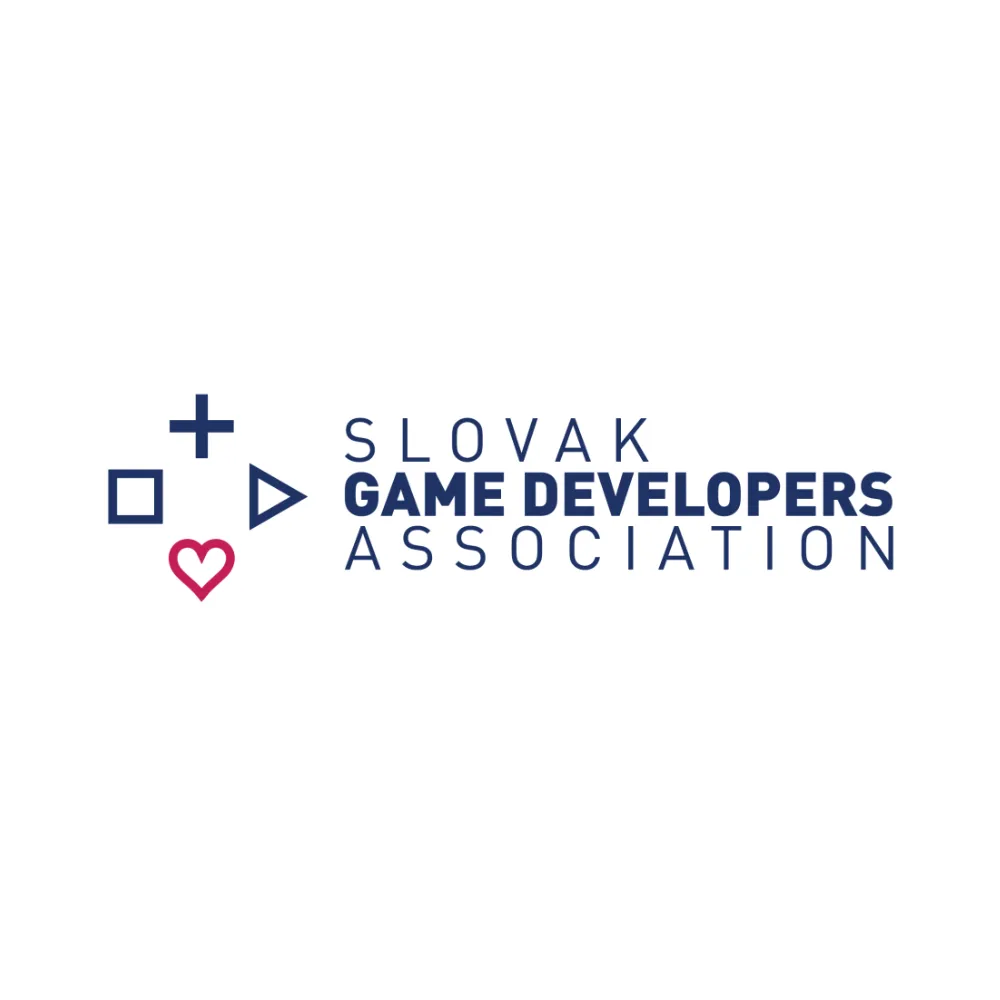BRIDGING RESEARCH, TECHNOLOGY, AND THE GAMING WORLD
Your partner in cutting-edge software development
Our mission is to transform human well-being and human-computer interaction. We do this by integrating virtual reality, augmented reality, and artificial intelligence technologies. At the heart of our philosophy is game-therapy. We create innovative, scientifically grounded, yet playful solutions for a wide range of challenges.

IMPACTFUL TOOLS FOR A BETTER QUALITY OF LIFE
Our products
ClaustrOFF
A game created with cutting-edge research to help you overcome fears in a safe, engaging, and effective way
NeuroBoostVR
Innovative exercises for seniors and others to improve motor skills, balance, and orientation with simple, effective activities
VIRADIA
Virtual Reality Platform for Early Diagnosis of Neurodegenerative Diseases, Revolutionizing Neurological Diagnostics
Experience the full power of VR for positive well-being
With a commitment to innovation and the transformative power of VR, we aim to make a lasting impact on mental health, education, industry, and personal growth, all grounded in scientific research and designed to enhance well-being worldwide.

GROWTH THROUGH INNOVATIONS
The GAMETHERAPY model
We harness the power of new technologies. By making care and training more accessible and tailored, we empower individuals and organizations to thrive. Rooted in scientific research, our innovative approach drives meaningful change, transforming mental health, education, healthcare, industry, and personal growth on a global scale.
SOLUTIONS THAT MAKE AN IMPACT
Immersive solutions for mental health and beyond
Our primary focus is on creating immersive applications that empower individuals to overcome challenges like anxiety, phobias, and neurological conditions. These solutions are designed to enhance well-being and unlock potential across various aspects of life, showcasing our expertise in innovative and impactful technologies.
Engaging VR/AR solutions for soft skills training
Evaluation in neurology and rehabilitation
General education
Personal development
Industrial training
Industry 5.0 applications

Join the Mind Heaven Community!
Be part of our journey to transform mental health care and well-being through innovation and gamification. By signing up, you’ll gain access to exclusive psychological content, enjoy discounts on our products, and stay updated with the latest news about our projects. You’ll also discover unique content like game stories and behind-the-scenes insights into our app development process. We value your ideas and feedback to make our games even better. Join us, become a co-creator, and help shape the future of the Mind Heaven Community!

How to Calm Anxiety Naturally: Techniques That Work
How to Calm Anxiety Naturally: Techniques That Actually Work

“Anxiety is a common mental health issue, affecting millions of people worldwide. While medication is effective for some, many prefer to explore natural ways to calm anxiety.” - Martin Polák
Fortunately, various techniques, backed by research, have shown promise in reducing anxiety symptoms. This article delves into evidence-based methods you can use to manage anxiety naturally.
With that said, here are 7 techniques you can use to beat your anxiety in an all natural way.
1. Mindfulness Meditation
Mindfulness meditation has gained widespread attention for its ability to reduce stress and anxiety. This practice involves focusing on the present moment without judgment. According to a study published in JAMA Internal Medicine, mindfulness meditation can significantly reduce anxiety symptoms in people with generalized anxiety disorder (GAD). Participants who practiced mindfulness for 8 weeks reported lower anxiety levels and improved emotional well-being compared to those who did not meditateto Practice Mindfulness:**
Set aside 10-20 minutes daily.
Focus on your breath, body sensations, or an object.
When your mind wanders, gently return your focus to the present moment.
2. Deep Breathing Exercises
Controlled deep breathing, especially diaphragmatic breathing, is a simple yet powerful tool for calming anxiety. A study in Frontiers in Psychology demonstrated that deep breathing activates the parasympathetic nervous system, which helps the body relax and reduces the heart rate, leading to less anxiety and stress .
Howce Deep Breathing:
Sit comfortably and close your eyes.
Inhale slowly through your nose for 4 seconds, letting your abdomen rise.
Hold your breath for 4 seconds, then exhale slowly through your mouth for 6 seconds.
Repeat for 5-10 minutes, focusing on the sensation of your breath.
3. Physical Exercise
Exercise is a natural mood booster that can ease anxiety. Numerous studies, including one published in Depression and Anxiety, show that regular physical activity can reduce symptoms of anxiety and depression by increasing endorphin levels and lowering the body's stress hormones, like cortisol. Both aerobic running or swimming and anaerobic exercises like yoga or weightlifting have been shown to be effective.
How to Incorporate Exercise:
Aim for at least 30 minutes of moderate exercise 3-5 times a week.
Activities like walking, cycling, and yoga can have significant mental health benefits.
4. Herbal Remedies
Certain herbs have calming properties that can help manage anxiety. Chamomile, in particular, has been studied for its anxiolytic (anxiety-reducing) effects. A randomized controlled trial published in Phytomedicine found that chamomile extract significantly reduced symptoms in individuals with generalized anxiety disorder compared to a placebo group . Lavender is another proven calming effects. A study in International Journal of Psychiatry in Clinical Practice showed that oral lavender oil effectively reduced anxiety symptoms in participants .
**Common Herbal Remedies for AnxChamomile tea or supplements
Lavender oil (can be used in aromatherapy or as an oral supplement)
Valerian root (used for sleep issues often related to anxiety)
Passionflower (can have mild calming effects)
5. Balanced Diet and Supplements
The link between diet and mental health is well-documented. A study in The Lancet Psychiatry revealed that a diet rich in fruits, vegetables, whole grains, and lean proteins can support mental health by reducing inflammation and promoting brain function . Additionally, certain nutrients like Ome acids, Magnesium, and B-vitamins play a critical role in managing anxiety.
A study published in Psychiatry Research found that Omega-3 supplementation reduced anxiety symptoms by up to 20% in medical students . Similarly, low magnesium levels have been associatereased anxiety, and supplementation may help alleviate symptoms .
Nutrients to Focus On:
Omega-3 fatty acids (found in seeds, walnuts, or supplements)
Magnesium (found in spinach, almonds, and avocados)
B-vitamins (found in whole grains, eggs, and leafy greens)
6. Improve Sleep Quality
Sleep and anxiety are closely related, with poor sleep often worsening anxiety symptoms. A study from Sleep Medicine Reviews found that people who consistently sleep fewer than 7 hours per night are at higher risk of developing anxiety . Practicing good sleep hygiene, such as going to bed at the same time and avoiding caffeine or electronic screens before bed, can help improve sleep quality and reduce anxiety.
Tips for Better Sleep:
Establish a calming bedtime routine.
Limit screen time 1 hour before bed.
Use lavender essential oil for relaxation.
Ensure your bedroom is cool, quiet, and dark.
7. Gratitude and Journaling
Practicing gratitude and maintaining a journal can shift your focus from negative thoughts to positive aspects of your life, reducing anxiety over time. A study in Journal of Clinical Psychology found that individuals who regularly wrote about things they were grateful for experienced less stress and anxiety .
How to Practice Gratitude:
Write down 3 things you're grateful for each before bed.
Reflect on positive moments from the day, no matter how small.
Conclusion
Managing anxiety naturally is not only possible but also supported by numerous scientific studies. Techniques such as mindfulness meditation, deep breathing, regular exercise, and herbal remedies can significantly reduce anxiety symptoms. Additionally, focusing on a balanced diet, improving sleep, and practicing gratitude can further support your mental well-being. While these methods may not replace professional treatment for severe anxiety, they offer a holistic approach that can complement therapy or medication. Always consult a healthcare provider before making any major changes, especially when using herbal supplements.
References:
Goyal, M., et al. (2014). "Meditation Programs for Psychological Stress and Well-being: A Systematic Review and Meta-analysis." JAMA Internal Medicine, 174(3), 357–368.
Zaccaro, A., et al. (2018). "How Breath-Control Can Change Your Life: A Systematic Review on Psycho-Physiological Correlates of Slow Breathing." Frontiers in Psychology, 9, 854.
Strohle, A. (2009). "Physical Activity, Exercise, Depression and Anxiety Disorders." Depression and Anxiety, 26(9), 1019-1030.
Amsterdam, J.D., et al. (2009). "A Randomized, Double-Blind, Placebo-Controlled Trial of Oral Matricaria recutita (Chamomile) Extract Therapy for Generalized Anxiety Disorder." Phytomedicine, 16(3), 251-257.
Kasper, S., et al. (2010). "Efficacy and Safety of Silexan, a New Oral Lavender Oil Preparation, in Subthreshold Anxiety Disorder–A Randomized, Double-Blind, Placebo Controlled Trial." International Journal of Psychiatry in Clinical Practice, 14(4), 275-281.
Sarris, J., et al. (2015). "Nutritional Medicine as Mainstream in Psychiatry." The Lancet Psychiatry, 2(3), 271-274.
Kiecolt-Glaser, J. K., et al. (2011). "Omega-3 Supplementation Lowers Inflammation and Anxiety in Medical Students: A Randomized Controlled Trial." Brain, Behavior, and Immunity, 25(8), 1725-1734.
Boyle, N. B., et al. (2017). "The Effects of Magnesium Supplementation on Subjective Anxiety and Stress—A Systematic Review." Nutrients, 9(5), 429.
Kalmbach, D. A., et al. (2018). "Sleep Disturbances and Short Sleep as Risk Factors for Depression and Perceived Medical Errors in First-Year Residents." Sleep Medicine Reviews, 36, 3-9.
Wood, A. M., et al. (2010). "Gratitude and Well-Being: A Review and Theoretical Integration." Journal of Clinical Psychology, 65(4), 376-386.






